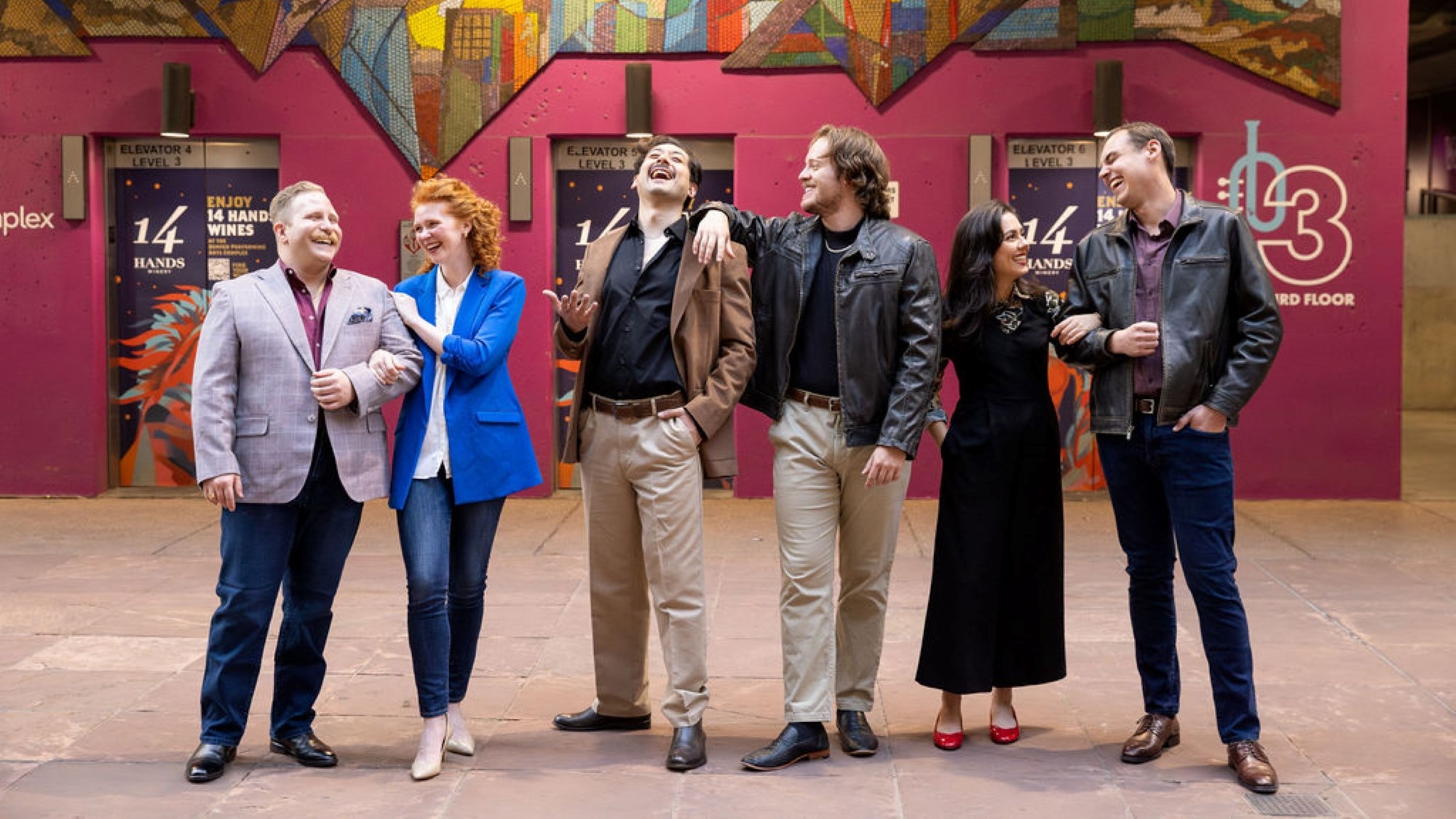Departure: Laugh Lines Q&A with Director Cherity Koepke

Comedy meets opera in Departure: Laugh Lines! Opera Colorado’s Artists in Residence take their final bow in this one-of-a-kind evening that channels the kitschy, chaotic charm of a 1950s vaudeville troupe. This year’s Departure transforms the Studio Loft into a retro comedy club and invites you to explore both the spotlight and the shadows—what the audience sees on stage, and what unfolds behind the scenes.
Act one features American Punchlines by Seymour Barab, a rarely performed gem that strings together vaudevillian jokes in a delightfully absurd one-act opera. In act two, the laughs continue with musical theater selections that capture the backstage life of the performers—comic, touching, and full of character.
 Before you see the live performance, hear from the Director, Cherity Koepke, in a Q&A about how Departure came to be and get a glimpse into the most exciting moments of the program!
Before you see the live performance, hear from the Director, Cherity Koepke, in a Q&A about how Departure came to be and get a glimpse into the most exciting moments of the program!
Get tickets for Departure here>>
What can you tell us about American Punchlines?
There’s no record that I can find of American Punchlines ever having been professionally performed. We’re likely going to be the first company that’s performed this in entirety, which is really exciting. It is the most unusual one-act opera that I’ve run across in a long time, in that it’s told through individual jokes, which is its only through-line. Every joke is its own story, and it’s unexpected each time. They’re vignettes. It’s very much a throwback to vaudevillian comedy.
What makes American Punchlines special?
It’s funny because this is not the show I planned to do this year. I had almost completely locked into another one-act opera, and I spent the week in thinking, “you know what, I like this, but I’m not in love with it—I’m going to give it one more day of researching and seeing what I find,” and that’s the day that I found American Punchlines. I thought that this is so different from anything we’ve ever done, it’s light and comedic, and I think groups of people need the opportunity to laugh together.
Shared laughter, in my opinion, is one of the most special forms of magic, and I think it’s the right time for us to create that environment for people to walk into and just have this experience where they’re laughing with complete strangers.
What is the relationship between comedy and opera, historically and now?
Most people think of opera as serious — and that makes sense, since the big, famous ones we all know are dramatic and packed with incredible music. But when opera first came onto the scene, comedy was a big part of it, too. It actually started in Greek theater, where they used musical breaks called intermezzi to tell funny, often political stories during intermissions.
They were poking fun at what was happening in the social environment of the time, and that has followed opera through generations. Take, for example, Marriage of Figaro, a very politicized comedy. Today, composers are not writing as many comedic pieces, but when they do, they’re very much attached to current events.
The thing that makes American Punchlines really special is that it is comedy for the sake of making people laugh, which is unusual in opera. Usually, the comedy in opera comes with something attached to it. This does not. It’s just purely for the sake of joy and laughter.
What can an audience member expect from this show?
When they walk into the performance space, it’s going to be like entering a comedy club. Then, the first half of the evening is American Punchlines, and it’s going to be unexpected. It’s going to be like watching an old movie with Gene Kelly and Danny Kaye, those vaudeville comedies that we loved in the 30s and 40s. After American Punchlines, which runs for about an hour, we have an intermission.
After the intermission, we change gears. The second half is musical theater selections, but more than that, it’s about what an artist’s life looks like behind the stage. Picture a comedy troupe sitting around in the green room: what are they talking about? What are they laughing about? What do their lives look like offstage, and how does comedy influence that? It’s going to be really fun. This half runs for only around forty-five minutes.
What is the rehearsal process like and how is it different from other productions?
The rehearsal process is fast. For the main stage, they’re in rehearsals for four to six weeks before we open a production. We’re in rehearsals for only two weeks before Departure goes up on stage. That said, there’s a certain beauty when you’re creating comedy in a short amount of time, because it stays very fresh. The humor doesn’t become anticipated, and it’s very natural in how it’s presented to your audience, so those laughs happen naturally.
It is still a challenge, especially when you’re working with music that the Artists in Residence don’t know, since there’s no recording of it. We’re working on new pieces that they don’t have any experience with, and we’re doing it in a really short time frame.
Why is the performance titled “Departure”?

“Departure” is something that Greg Carpenter came up with. It was a title that he stumbled on, and we found it to be really fitting. We were trying to find one word to describe not only the final performance of the season for the Artists in Residence (before their departure), but also something that signified this performance as being a different type of production from what Opera Colorado usually does on the main stage. In that way, it’s a departure from our normal programming. I’m incredibly proud of that this company has a program like this that shines a light on our incredible Artists in Residence, who do so much with us and for us throughout the season. They have this final spotlight on them before they go off to their next thing. I think it’s a really special way to end the year.
–
 Departure: Laugh Lines is a wonderful way to experience opera like never before and witness the growth of the Artists in Residence over the past season. The director chooses these pieces specifically for the Artists after an entire season of learning about their voices. It will truly be a performance for the ages!
Departure: Laugh Lines is a wonderful way to experience opera like never before and witness the growth of the Artists in Residence over the past season. The director chooses these pieces specifically for the Artists after an entire season of learning about their voices. It will truly be a performance for the ages!
Join us on May 29 & 30 in the Studio Loft at the Ellie Caulkins Opera House for Departure: Laugh Lines. Get tickets here>>


